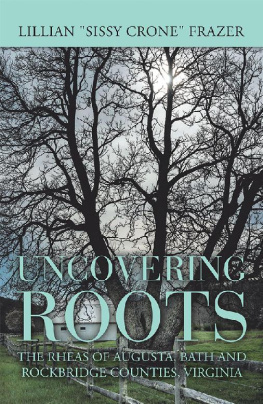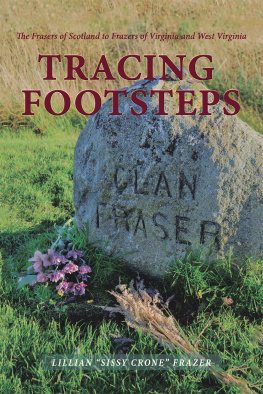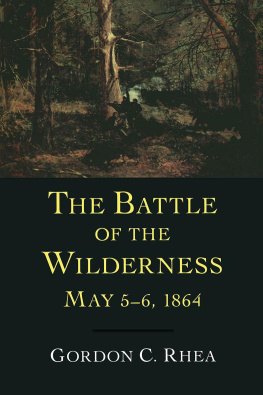LILLIAN SISSY CRONE FRAZER
UNCOVERING
ROOTS
THE RHEAS OF AUGUSTA, BATH AND
ROCKBRIDGE COUNTIES, VIRGINIA

AuthorHouse
1663 Liberty Drive
Bloomington, IN 47403
www.authorhouse.com
Phone: 1 (800) 839-8640
2020 Lillian Sissy Crone Frazer. All rights reserved.
No part of this book may be reproduced, stored in a retrieval system, or transmitted by any means without the written permission of the author.
Published by AuthorHouse 01/23/2020
ISBN: 978-1-7283-4439-3 (sc)
ISBN: 978-1-7283-4438-6 (e)
Library of Congress Control Number: 2020901163
Any people depicted in stock imagery provided by Getty Images are models,
and such images are being used for illustrative purposes only.
Certain stock imagery Getty Images.
Because of the dynamic nature of the Internet, any web addresses or links contained in this book may have changed since publication and may no longer be valid. The views expressed in this work are solely those of the author and do not necessarily reflect the views of the publisher, and the publisher hereby disclaims any responsibility for them.
CONTENTS
The purpose of this writing is to discover the Rhea ancestors in what was Augusta County, Virginia during colonial days and trace the heritage to the family of Palmer Rhea, Sr. In doing so, other Rhea family members, such as uncles, aunts and cousins were discovered, and those have been listed briefly.
This writing originated with the research of my own family. While doing so, Palmer Rhea, Jr. graciously, without complaint, accompanied me to courthouses, cemeteries, and numerous other locations as well as endured the countless hours I buried myself in our home office organizing and writing. Realizing the richness of family, I toyed with the thought briefly before stating, When we finish researching my family, we will search for your roots? Little did I know the Rhea family involved voluminous family members nor was I prepared for the tremendous effort required to document Palmers heritage and the magnitude of names I would encounter.
I do not credit myself as an historian nor a researcher by profession or education; however, during these last ten years of various family searches, I have become an amateur one. Joy of local history and the quest to solve puzzles and the patience and thirst for accuracy and verification serve as great tools.
Discovering family satisfies a curiosity. One learns of the challenges faced by ancestors, struggles endured, accomplishments shared, the good and sometimes the bad. For some, ancestors played a part in who we become, whether encouraging or pushing us to become someone different. We are partially a result of accumulations of our experiences and surroundings, and many ancestors play vital parts in these experiences. In this writing, it is evident the Rhea family actively participated in important roles in the development of our colonial life. Not only has the generations of the Rhea family been affected but so have numerous other families trailing them.
On frequent occasions over the past few years, Palmer, Jr. and I jumped into his truck and ventured to courthouses, church cemeteries, and farmland once owned by Rhea family members. Many of these were small communities, places of age and endurance, separated by mountains. Their beginnings were in the mountains with their majestic trees and soft peaks, and at times shrouded in clouds and fog. The distance was centuries in time. We attempted to capture a spirit of a time gone by as we snapped pictures, stood solemnly over gravesites with faded headstones, viewed farmland, and visited countryside churches in which families had worshipped. Some of this land appeared to be in an isolated world, beautiful and intriguing, with little change in the past two-hundred-plus years while other land reflected modernization and growth.
We ordered books on the Rhea family, searched ancestor sites and old newspapers, checked court records, viewed cemetery records and county historical society records, talked to family members, documenting family and history and at times sat sprawled over the green grass and thick spread of trees as we thought of ghostly ancestors. It took years of research, documenting, and writing to absorb the wealth of Rhea family names. All was pulled together for this writing. When completed, I felt a connection to the family, strangely feeling as if I had known them. I had developed an admiration and respect for them and their lives.
Certainly, there are descendants not included and some information was passed from family and unable to be documented. Throughout this writing, great care and enormous effort were given for accuracy and a curious nature was displayed for knowledge on the family. As much as I desired to hear faded echoes of voices guiding and leading me to family history, instead, much of our findings I contribute to researchers who have already documented many of the Rhea family, enabling me to collect numerous information on the various family members. Additionally, we spent years of personally researching everything we could locate and talking with many who amiably were willing to share information with us.
The Rheas of what was Augusta County, Virginia, which later became Bath County and other counties, included in this writing descended from Robert, Archibald, and William Rhea who first settled in Augusta County in the mid-1700s and those of Margaret Rhea, thought to be a cousin to the brothers. An elder Archibald Rhea lived in Augusta County during these years and circumstances lead to him most likely being the father of the three Rhea brothers and an uncle to Margaret, although this has not been proven. Several researchers, sources, circumstances, and records indicate these three Rhea brothers and Margaret are thought to be grandchildren of Matthew Campbell Rhea of Scotland and Ireland. And, so, my story begins with him.

According to family legend, Matthew Campbell of Scotland took an oath to the Protestant faith, and in 1685, assisted his cousin Archibald Campbell, the 9 th Earl of Argyll, in raising an army for the cause of the Duke of Monmouth (James Scott, the illegitimate son of Englands King Charles II and Lucy Walter). During the Monmouth Rebellion in the uprising, Archibald Campbell, the Earl of Argyll, was captured and beheaded. Matthew Campbell was supposedly captured and sentenced to life in prison but escaped and fled to Ireland and changed his name to Reah (one of the variations of the name and later changed to Rhea).
That the three Rhea brothers of Augusta County are grandchildren of Matthew Campbell The Rebel Rhea of Scotland, who is thought to be the son of Walter Campbell, has not been proven nor disproven to my knowledge nor has this Matthew Campbell Rhea yet been proven to be the son of Walter Campbell. These stories are passed from researchers of the Rhea families and descendants of Matthew Campbell Rhea, including the historical writings of memoirs of U.S. Congressman John Angus Rhea (1753 1832) of Sullivan County, Tennessee. When no documented records are available, it is information shared by descendants that is often relied upon.
U.S. Congressman John Rheas father was Rev. Joseph Rhea and his grandfather was Matthew Campbell Rhea II, son of Matthew Campbell Rhea of Scotland and Ireland. Rhea County in Tennessee and Rheatown, an unincorporated community in Greene County, Tennessee, were named in U.S. Congressman John Rheas honor. John Rheas memoirs, historians, and other sources located believed due to circumstances and obtainable records this Matthew Campbell Rhea of Scotland is the founder and the root of the Rheas in Virginia, Tennessee, Pennsylvania and other areas unless additional information becomes available to state otherwise. You may come to your own conclusion.
Next page







